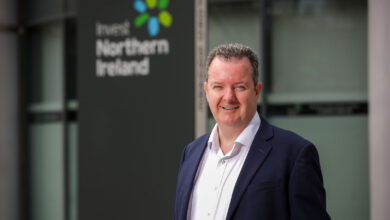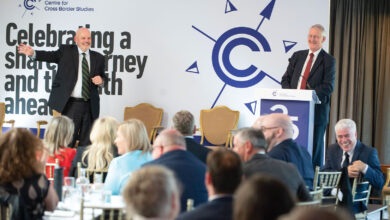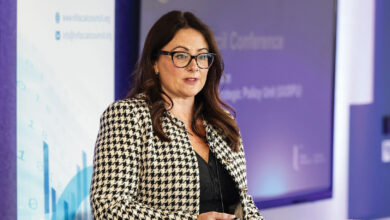Reflections on a place
 David Gavaghan reflects on his time at SIB as he prepares to leave Northern Ireland.
David Gavaghan reflects on his time at SIB as he prepares to leave Northern Ireland.
As I clear my desk, re-discovering old documents, I look out of my window at the eerily silent Belfast City Airport, with the magnificent backdrop of Divis and Black Mountain and Belfast Harbour. I reflect that this island is one of the most beautiful places on the planet. It has been a privilege to have worked and lived here for the past six years. It is too soon to have sufficient perspective but here are a few observations.
Sharing this island has to be a sine qua non – a senior unionist politician recently wrote “we share in common our homeland”. If we cannot share this land with each other, it seems a forlorn hope to expect others to come here. This island is one of the least populated parts of Europe, notwithstanding the temperate climate and profound civilisation. Had the population grown at the same rate as almost every other part of the EU over the past 200 years, some 12 million people would inhabit the island rather than some 6 million (c. 1.75 million in Northern Ireland and Belfast’s population still declining!).
In this vein, we should focus on our cities as the engines of growth over the next 20 years. Both Belfast and London~Derry are fundamental to the economic, social and environmental transformation that everyone wants. There is enormous potential and talent here. It is palpable how much progress has been made in the past decade; let’s ensure that as economic times get harder, we are resolute.
To catch a glimpse of this future, you only have to read the excellent report commissioned by InterTradeIreland and prepared by two all-island engineering bodies (www.iae.ie). To fulfil this increase in population, we need to entice back tens of thousands of people who have left these shores and many more who have never been here. We should heed the words of Enrique Peñalosa, who assisted in a remarkable transformation of Bogota; he said that by building a “successful city for children, we will have a successful city for all people”.
On the ratio of public to private, the public sector is too big but equally the private sector is too small. Enterprise must thrive including social enterprise. If the ratio today is 70:30, we need to shift enterprises from public to private transforming the ratio to 60:40 and, in time, to 50:50. Forthcoming public expenditure cuts will shrink the public sector but it could reduce the private sector. Political leadership will be vital but so will engagement from business – this requires collective determination to unleash entrepreneurial spirit!
The creation of vital jobs is fundamental. Benchmarking our tourist industry to the other regions on these two islands, it reveals there is a tangible deficit. 2012 provides a lifetime opportunity with the prospect of attracting potentially one million visitors to Belfast to celebrate the Titanic’s centenary – at the time, one of the greatest engineering feats in Ireland’s history. In 2013, London~Derry celebrates another historical moment. Potentially, as one of four remaining candidate cities for the UK City of Culture, it could be a year of real celebration, showcasing our bountiful culture and capturing again the world’s imagination with our story of “turning swords into ploughshares”.
Finally there is an urgent need to tackle our dependence on imported energy. This island’s wealth and long-term sustainability is haemorrhaging as oil prices rise. We need to set clear dates to put in place the infrastructure that will liberate us from another economic hegemony, re-energising the full potential of our people. Ironically, the pursuit of “green” energy might be one way of conjoining the two traditions on the island to create one community. In turn, this will allow more traditions to join our new community, as we confidently face the prospects of this exciting new dawn which a future saint (and scholar) predicted over a century ago, that he saw a place that had had a long night but would have, in time, a long day.
David Gavaghan was Chief Executive of the Strategic Investment Board Limited 2004-2010. He is now Head of Fund Management for Quintain plc in London.





